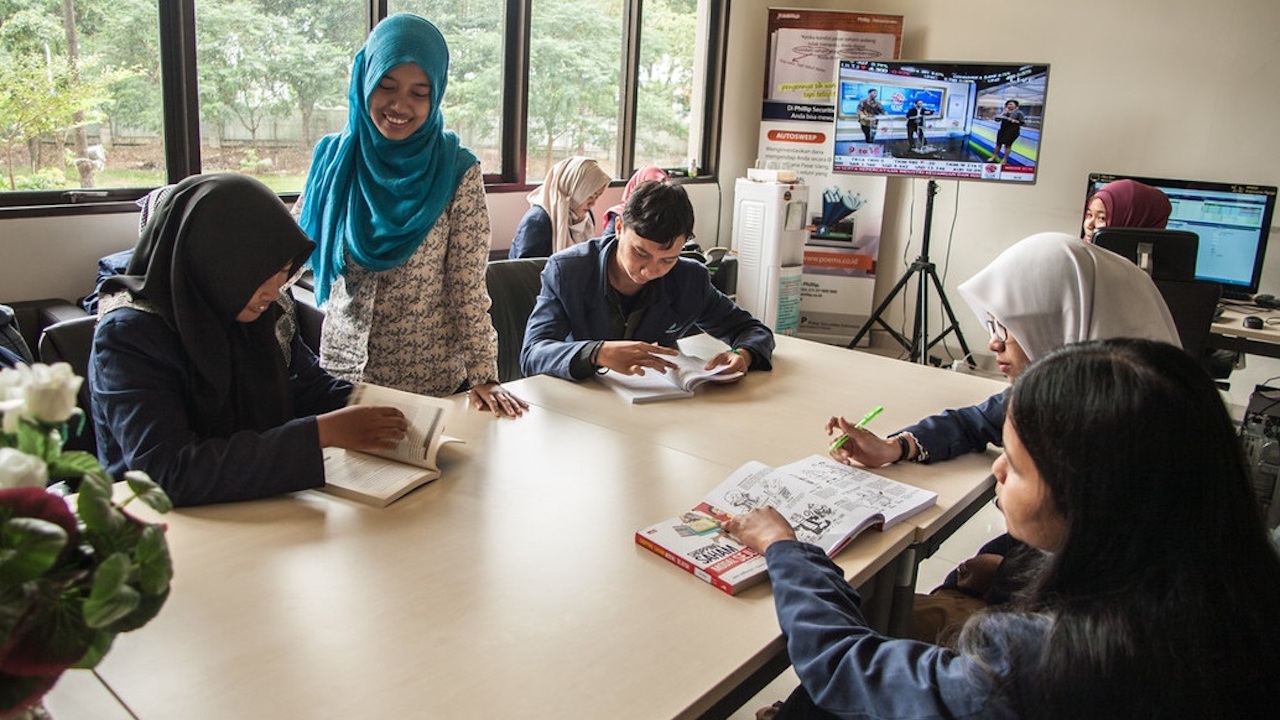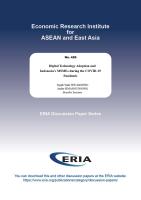
The education ministry has prepared a medium-term investment plan for higher education that promotes entrepreneurship at top universities. Photo credit: ADB.
Young entrepreneurs are powering up Southeast Asia’s largest economy as it moves toward a post-pandemic recovery.
Young entrepreneurs are powering up Southeast Asia’s largest economy as it moves toward a post-pandemic recovery. Next to Singapore, Indonesia has the greatest number of unicorns, startups valued at over $1 billion, in the region. The coronavirus disease (COVID-19) crisis may have slowed down economic activity in general, but it has accelerated the shift to e-commerce and digital adoption, benefiting fintech and logistics start-ups.
More than a third of young people in Indonesia aspire to become successful entrepreneurs, inspired by the likes of Kevin Aluwi and William Tanuwijaya, who launched Gojek and Tokopedia with their friends in their 20s. Now in their 30s, they merged their ride-hailing and e-commerce start-ups, which together is estimated to contribute 2% of the country’s gross domestic product.
However, not all budding entrepreneurs are created equal. Many require mentoring and lack access to the necessary resources to turn their ideas into a viable business.
For years, Indonesia has invested in entrepreneurship development programs to tap the full potential of its youthful population. Start-up incubators are either directly supported by the government, funded with the help of bilateral donors, or part of corporate social responsibility programs.
Today, the government is keen to scale up these programs to drive the country’s digital transformation and boost the economy. The Ministry of Education, Culture, Research, and Technology has prepared a medium-term investment plan for higher education for 2020–2024 that promotes entrepreneurship at top universities and aims to accelerate innovation in new technology.
Four entrepreneurship programs
A recent study by the Asian Development Bank (ADB) supports this effort by looking at best practices in nurturing start-ups in the country and providing recommendations on how to further strengthen entrepreneurship education and replicate successful models. It covered four entrepreneurship development programs:
- IncuBie (Pusat Inkubator Bisnis) of state-run Institut Pertanian Bogor (IPB University). It offers a 3-year incubation program that provides access to training, mentorship, networking, and finances.
- Directorate of Business Innovation and Incubation of University of Indonesia. The 1-year program is open only to students and alumni. It provides 6 months of pre-incubation support, including helping applicants pitch their business idea. It also offers post-incubation acceleration of the business.
- PENS Sky Venture of Surabaya State Electronics Polytechnic. The 3-year incubation program is available to students and those sponsored by the Ministry of Education, Culture, Research, and Technology. The latter are accepted into the program only for a year, but this may be extended for 2 more years.
- Asia Entrepreneurship Training Program. This is a start-up accelerator program open to Indonesian and Swiss start-ups that want to venture into the international market. It was launched in 2019 and supported by the Swiss government under the mandate of Leading House Asia of ETH Zurich in collaboration with the ZHAW School of Management and Law.
These programs have enjoyed relative success, particularly the Directorate of Business Innovation and Incubation. This program boasts of a 100% graduation rate, and its graduates have received local and international recognition for their innovations.
Recommendations
The study’s recommendations focus on improving management and financial sustainability, mentorship and training, business services and facilities, graduation and post-incubation, and documentation and evaluation.
Improve management and financial sustainability. Strengthen the supervisory or advisory board by recruiting diverse expertise and leveraging on university resources. Maintain a good management staff-to-client ratio. Diversify funding sources and ensure financial sustainability.
Offer a full suite of business services and facilities. Incubators should understand their target market well to attract the right applicants and help them become good entrepreneurs. Services should include pre-incubation support and assistance on business registration, permits and licenses, etc.
Enlist both technical and business development mentors and develop a network of experts from the public and private sectors. Ensure mentorship and training programs are open to offbeat ideas and support the creation of new products and services. There should be enough office space and infrastructure to support product development.
Incubators should provide guidance on how to prepare winning investment proposals and how to use funding grants efficiently.
Ensure a smooth transition for graduates. There should be clear exit criteria for graduation. Provide post-incubation services, such as consulting services and networking activities.
Set up a robust documentation and evaluation system. Keep track of graduates. Collect and analyze data regularly and use this to evaluate services and programs.
Develop a strong network. Create and leverage on a strong ecosystem of academic and business communities, government agencies, and state-owned enterprises.
This article was first published by BIMP-EAGA on 15 December 2021.

BIMP-EAGA
The Brunei Darussalam–Indonesia–Malaysia–Philippines East ASEAN Growth Area, or BIMP-EAGA, is a cooperation initiative established in 1994 to spur development in remote and less developed areas in the four participating Southeast Asian countries.


